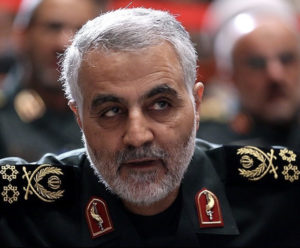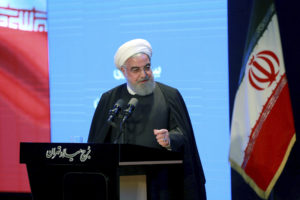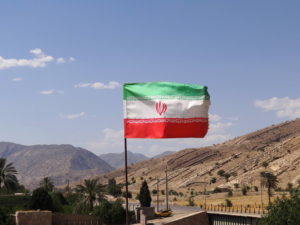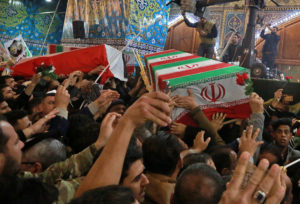The Unsung Victims of the Emerald City
There's a group of contractors working in Baghdad's Green Zone that we don't often hear about: The cleaners, cooks and construction workers from places like Uganda who toil and die in obscurity.
2 a.m.: As soon as a Blackhawk helicopter deposits me in Baghdad’s palatial Green Zone, I’m welcomed by four Peruvian checkpoint guards: “Buenas noches, señorita.”
The men slouch beneath a grove of towering date palms and wave me closer with their dust-flecked M4s — so close, in fact, that I can see a small photo of a guard’s child dangling from his neck like an amulet. Can they point me toward the U.S. Embassy? No. Can they offer me a map? No. It turns out the guardsmen don’t speak a lick of English, which leaves me to my threadbare Spanish to patch together my fate: I’m not allowed to enter my accommodations until I flash a laminated media badge, and I can’t get my hands on a laminated media badge until I enter my accommodations.
Welcome to the Green Zone, señorita — though it’s been said to moonlight as the Green Zoo.
3 a.m.: An excitable National Guard specialist from Boston, known to the Peruvians as “Chorizo,” spots me from his massive SUV and offers me a ride to the official media badging office, with a preliminary stop at the late-night chow hall. Driving his unarmored vehicle like a souped-up Mustang — Chorizo couldn’t be older than 23 — he speaks rapturously about the garlic potatoes and French toast that await us in one of Saddam’s former palaces.
The guards in front of the facility share Chorizo’s youth, but not his enthusiasm; their chafed expressions say, “Did I really travel 2,390 miles from Uganda to the world’s most dangerous city so I could police the late-night munchies of Americans?” They were recruited by a private contractor based in Lenoir City, Tenn. — a multimillion-dollar enterprise named Explosive Ordnance Disposal Technology — but they approach their job with the improvisational spirit of a generic East African checkpoint: First, they chat among themselves about whether or not to take our passports while we eat, and then, when they reach a vague consensus (why not?), they joke about how they’ll try not to lose them.
Chorizo gets pissed. “But that’s never been the rule before,” he protests. “And I’ve eaten here a million times.”
“Well, then you should know how often we change the rules,” one Ugandan says with a wry smile.
6 a.m.: Just when I’ve finally nodded off on a vacant mattress for the night — courtesy of the media badging office — an earsplitting blast jolts me from sleep. An Army escort grabs me, shoves me to the concrete floor and takes position over me as loudspeakers crackle with belated advice: “Duck and cover! Duck and cover!”
After a stunned stretch of silence, Chorizo’s voice busts through the wall that separates us. “Whooooeeee!” he hoots. “I mean, holy shit, that was a close one!” He’s right: Two rockets just collided with our compound — one exploding against the rooftop, another smashing into a blast wall 50 meters from my window. The impact was enough to catapult a small hedgehog from his burrow and onto our gravel driveway. Chorizo scoops the shocked critter into a silver bucket, elects him our mascot and allows me to christen him “Sonic.”
We’re officially under attack. The barrage of artillery continues for more than 14 hours and nearly 20 blasts, constituting one of the fiercest and most systematic assaults on the Green Zone in over a year. Rocket shrapnel carpets the road outside the badging office, and KBR workers collect the opalescent hunks in Styrofoam cups to save for their grandkids or sell on eBay. Smoke rises over the four-mile compound at random intervals, prompting civilians to run frantically for bunkers within the U.S. Embassy complex at least three times — some wearing designer suits, others wrapped only in bath towels.
We don’t know it yet, but the daylong barrage that’s commenced at dawn on Easter Sunday will soon morph into a weeklong attack, which will evolve into a monthlong fusillade. With renewed currents of vulnerability coursing through the highly fortified compound — at least 114 rockets and mortar rounds would crash down here in the coming month — an important question emerges: Who bears the brunt of all this Green Zone-bound hellfire?
At the top of the Most Vulnerable Player list sit Iraqi civilians. At least 13 perished in the Easter Sunday attack, when a cluster of rockets fell short of the Green Zone’s gates and ripped through the homes of everyday Iraqis. Civilian casualties also have surged at the hands of U.S. forces, as they struggle to retaliate against rocket-lobbing Shiite militiamen. On April 29, for instance, a 2-year-old boy named Ali Hussein was photographed within the rubble of four homes destroyed by wayward American missiles in Sadr City; he died that same day in a hospital crammed with other wounded civilians.
The second most susceptible group, I’m willing to guess, is made up of the private military contractors working inside the Green Zone: the Peruvian guards who stand watch near the airfield, the Ugandans who guard the well-stocked chow halls, and a host of foreign contractors known as “third-country nationals” (TCNs) who work as cleaners, cooks and construction workers. These men — and a handful of women — perform their duties in the open air without the most basic safeguards of body armor or Kevlar helmets. At night, they fall asleep, or don’t, inside flimsy metal shipping containers known as “tin cans,” where several contractors have met fiery deaths over the past two months (including Paul Converse, an American working for the special inspector general).
According to the Ministry of Interior, at least 14 non-Americans have died in the Green Zone since the March 23 attack — mostly due to wounds incurred by indirect fire. But my experience here on the ground, comparing official news releases with firsthand casualty reports, has taught me to assume much higher death rates for TCNs than make it into the mainstream media. The U.S. Labor Department’s body counts are based on the number of families that file for death benefits, despite the fact that non-Americans don’t conventionally submit such claims — and may not even know that the option exists.
For weeks to come after the Easter Sunday attacks, the media chatters about the ugly semiotics of the rocket blasts: Did they definitively take the “green” out of the Green Zone? Televised pundits dispute what the bursting of America’s would-be bubble in Baghdad portends for the U.S. presidential elections, and U.S. presidential contenders debate what the possible Iranian origins of the rockets mean for the future of American foreign policy.
But no one bothers to mention the dead and wounded TCNs. No one prints their names in the papers or digs up their family photographs. Their conspicuous absence functions as my introduction to a sour truth of combat reporting: “If it bleeds, it leads” may be the tacit motto of the genre, but, apparently, most war reporters are checking passports at the gates.
Your support matters…Independent journalism is under threat and overshadowed by heavily funded mainstream media.
You can help level the playing field. Become a member.
Your tax-deductible contribution keeps us digging beneath the headlines to give you thought-provoking, investigative reporting and analysis that unearths what's really happening- without compromise.
Give today to support our courageous, independent journalists.






You need to be a supporter to comment.
There are currently no responses to this article.
Be the first to respond.